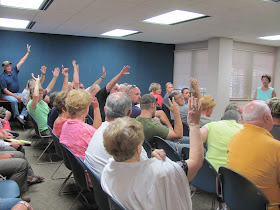When I was first commissioned by the Lowell Ledger to report on a "union meeting" at the Englehardt Library, I had no idea that I would get involved in a story that was far too big to be contained in the one article I was writing. Over the next few weeks, the struggle between two opposing sides over the wording of a contract for utility workers would bleed over into other facets of my life, confusing the boundaries of "that story" and "my story" until I found myself part of a narrative about the people and the governing bodies they elect. What I was actually experiencing was the life story of a small town in Michigan called Lowell, or, in other words, a big dream in the collective consciousness called America.
My mission was bi-fold, to reveal and to simplify - to reveal because the contract negotiations had gone on for over a year between union lawyers and city lawyers "behind closed doors," and to simplify because the entirety of the story would have to fit on half a page with a possible addendum in the back of the paper. When I was first hired on to the Ledger in November of last year, publisher Jon Jacobs described how difficult it was that City of Lowell and Lowell Light & Power would not give even the littlest scrap of information to the public about their negotiations. Nearly a year later, I had thought that everyone at the Lowell Ledger had forgotten about this struggle when I was given my first assignment to cover an informational meeting that a municipal watchdog group named VOICE (Voters Organized in Civic Excellence) of Lowell had put together.
 |
| Democracy at work in Lowell, Michigan. |
If the diametrical opposition still screams in your ear, consider the similarities one can find between the "two groups." Barbara Barber took over leadership of VOICE of Lowell after founder Ivan Blough died in June of 2010. Ivan Blough was a legend of a man, Lowell's own Paul Bunyan or John Henry. I'd even heard stories of the man, and I was raised in a completely different town. Ivan never put any limits to the types of structural problems he could repair nor the types of social injustice he could battle, doing repairs on the Lowell showboat and striving to keep the community informed on what was going on in their town. If you were to try and find someone to compare in Lowell today, I'd be hard pressed to find anyone more committed than Greg Canfield of Canfield Plumbing and Heating. I first met Greg while reporting on his activity in raising money for the local food pantry at Flat River Outreach Ministries (FROM) through Lowell's Food Fight charity competition, but Greg's philanthropic work extends to paying for water heaters for people in need and doing pro bono work for flood victims. You could argue that taking the time to be on the Lowell Light & Power board is just as charitable as any of his other work, especially because running your own business keeps you busy enough as you are. Of course, you cannot make this comparison if you think we're discussing yeses and nos, odds and evens, pros and cons, because these two great-hearted men who have so much in common exist at opposite ends of the extreme, at least according to "the simplification," Ivan Blough with the people and Greg Canfield with the powers that be.
 |
| The Canfields supporting Flat River Outreach Ministries. |
But for the workers at Lowell Light & Power and City of Lowell utilities, a contract will be forced upon them by their municipal leaders whether they like it or not if negotiations do not result in an agreement within the next couple of months, so all of this peace, unity, and camaraderie that is so evident to me is likely to be on hiatus for those who are in the thick of it. I get to walk in and out of this situation, but these people have no other home for the next few months than the jungle. My heart goes out to them all.


